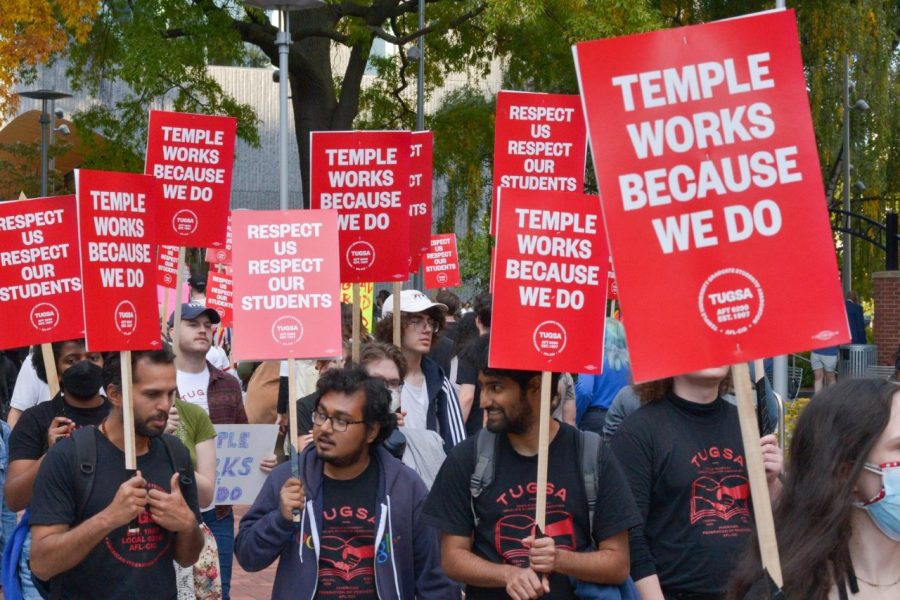TUGSA Strike Should Inspire Change
TUGSA’s demand for higher wages should inspire students nationwide, including at Villanova.
March 1, 2023
On January 31, 2023, graduate students at Temple University in North Philadelphia went on strike, demanding better pay and benefits, as well as improved working conditions.
The “Temple Graduate Strike” is actually part of a larger wave of labor activism in the United States, as workers across various industries have been demanding better treatment and compensation.
Graduate students have been at the forefront of this movement, as many universities rely on them to perform essential research and teaching duties, yet often pay them only a little over minimum wage.
Months prior to the strike, Temple University Graduate Students Association (TUGSA) had been negotiating with the university, but was met with no change.
TUGSA had several demands, including a raise in minimum pay, more comprehensive health insurance and increased support for students with families.
Temple initially refused to meet these demands, leading to the strike. The only contract it offered was to raise salaries to $22,000 by 2026. This contract was quickly shut down by the Student Union, which had been demanding salaries of around $32,000, a $13,000 increase from the original salaries of $19,000. During the earlier period of striking, classes were canceled or relocated, and some undergraduate students even joined the picket lines in solidarity with the graduate students.
“The strike has caused major disruption on campus,” Temple undergraduate student Molly Sabol said. “The strike has been going on for a few weeks at this point, such that students have been left without instructors for their classes.”
Sabol also noted issues surrounding the replacement workers and their own compensation.
“In some cases, the university hired scabs [non-union workers taking the strikers’ places] to take over the striking TAs’ classes,” Sabol said. “The scabs are reportedly making more money than TAs were originally.”
In response to the graduate strike, the university has removed tuition remission and even healthcare benefits for striking students.
The strike received significant media attention, both locally and nationally, with many pointing out the irony of a university that claims to value education and research failing to support the very people who make those things possible.
“The university makes so much money, and I do not think it is unreasonable to provide grad students with better working conditions, higher pay and increased parental leave,” Sabol said. “Every day that I walk to class, I see a huge group of grad students on the picket line.”
Sabol and other Temple students are optimistic to see the talk surrounding the strike.
“It is really inspiring to see how much attention and support this strike has received,” she said. “I hope Temple does the right thing by listening to the grad students’ concerns and working with them to ratify a fair contract.”
Although TUGSA is exclusive to Temple, the demand for higher pay is prevalent at Villanova, as well. Thus, students should not take the news of the Temple graduate students’ strike lightly.
With Pennsylvania adhering to the federal minimum wage of $7.25 an hour since 2009, and increased inflation in recent years, there is certainly tension between overworked students and their low wages.
Student workers at Villanova are also discouraged by low wages for their campus jobs. Despite the recent increase for Dining Services workers’ pay to $17.50 per hour, the wages for most jobs on campus remains at $10 an hour, no matter how the tasks vary.
With a large student population coming from different states and countries, it is natural to compare the Pennsylvania minimum wage to that of one’s home state or country.
Originally from the state of Maryland, with the minimum wage having been recently raised to $13.25 in 2023, I also felt disdain towards the wage I make as a student worker at Falvey. Although my job is not particularly physically taxing, it still requires a certain level of creativity and contribution.
Other student workers share similar opinions about the disparity between their work and their pay. Compared to Villanova’s tuition rate, the money earned from minimum wage jobs for student workers amounts to only a tiny fraction.
One thing is for certain: the TUGSA strike will not be the last student strike in this country, as more and more student workers rightfully fight for fairer wages.










